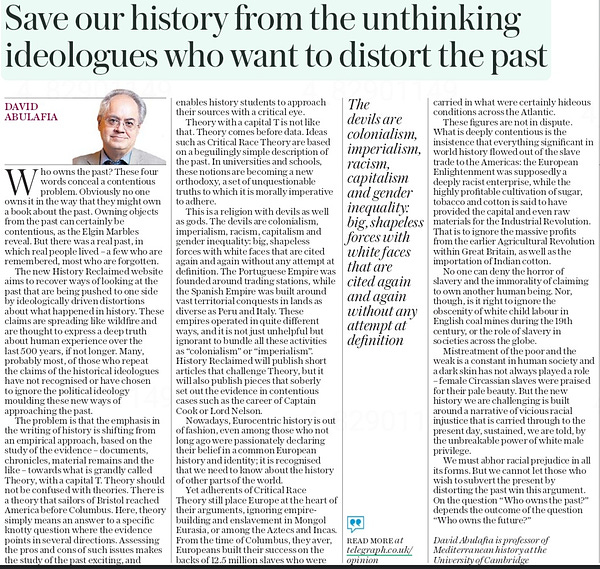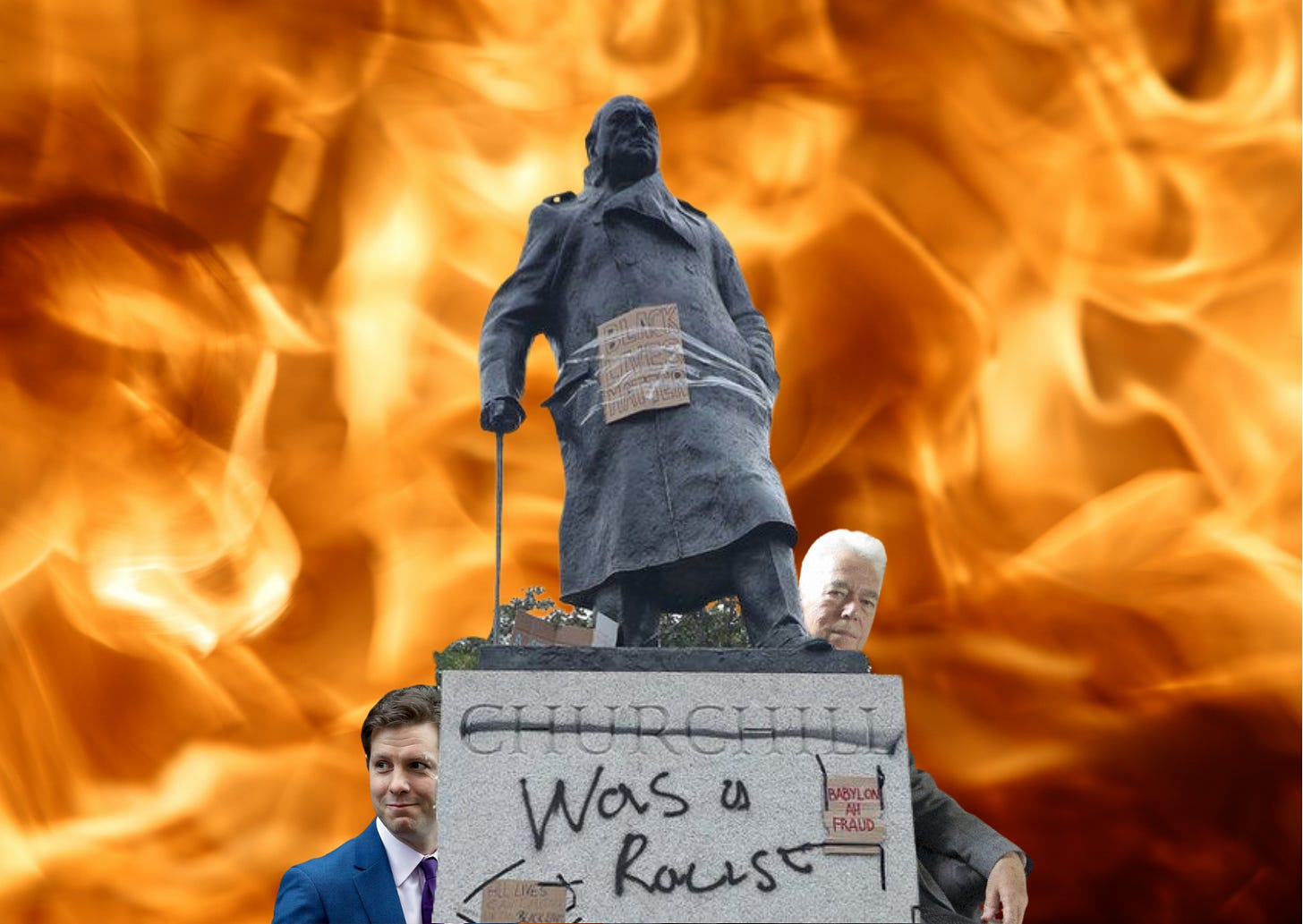Tombs, tantrums, and daddy Churchill: The Times and Telegraph endorse another 'war on woke' to protect their childish dreams...
You see they have history while you have 'narratives'.
The memory of Winston Churchill — or at least the one they deem acceptable — is so precious to British right-wingers that they fetishise his statue in Westminster as if it is about to start crying tears of blood at any moment. Barely a day passes without a column in one of the newspapers throwing the shadow of Churchill’s not-inconsiderable bulk over contemporary events or suggesting that the young, the left, or even worst the young and left have tried to ‘cancel’ the ‘great’ man again.
One of the most frequent participants in the ‘angry that history is more complicated than a war movie marathon’ industry is Robert Tombs, an emeritus professor of history at the University of Cambridge, who pumps out op-eds about how history has been ‘hijacked’ by the ‘woke’ with such thirst that it makes Churchill’s daily glug glugging of whiskey, brandy and champagne look positively moderate.


Tombs’ latest scheme to keep his name in the newspapers is what The Sunday Telegraph described as “top scholars [launching a] fightback against the woke brigade’s ‘blatantly false’ reading of history” but which anyone with all their hinges still intact would sum up as a website. The paper wrote:
In academic circles, there has been growing consternation at the steady march of “woke” ideology which has seen statues pulled down, university degrees “decolonised” and museum exhibits relabelled or removed altogether.
Now some of the country’s most eminent professors have decided that enough is enough.
No longer content to stay silent, they are mounting a fightback as they say “distortions” and “blatantly false” readings of history have become so widespread that they threaten to undermine Western civilisation.
A fightback, you say? Are they taking to the streets? Marching on the official British headquarters of woke (which I believe is a small coffee shop in Spitalfield’s Market)? No, it’s a website, which this ragtag band of permanently angry academics is promoting with some predictably over-heated rhetoric.
Much further into The Sunday Telegraph report, after lots of rhetoric from Tombs and friends — which sounds like a travelling vampire circus — it gets to the point:
The History Reclaimed site will be co-edited by Prof Tombs and David Abulafia, emeritus professor of Mediterranean history at Cambridge.
… The website’s intended audience is the general public who are not experts in history, but are concerned by what they have read, according to Prof Tombs.
“You read in the paper that Churchill is a racist and you think could that really be true? The idea is to publish short and accessible pieces which they could read,” he explained.
“Our articles could also be read by ministers, civil servants, trustees of museums and galleries, or local authorities who may come under pressure.”
Tombs is a historian of France and co-editor of Briefings for Brexit, a continuity Leave website obsessed with ‘owning’ remainers. And he’s very upset about people being beastly to Churchill, Gladstone, Robert Peel, Nancy Astor, Francis Drake, and Christopher Columbus via the terribly unfair means of looking at things those historical figures did and said. Beneath their academic titles and claims to scholarly detachment, there is a childish idea of history at work among this group, a stannish desire to protect their favourite characters from uncomfortable scrutiny.

Professor Doug Stokes from Exeter University’s Politics department, is also part of the History Reclaimed project — Reclaimed from who, folks? And to what end? — and told The Sunday Telegraph:
We are pushing back against a very simplistic narrative about slavery and colonialism that has taken hold. Unless we push back, this will continue to be imposed on the British public. Broadly speaking, this country has played a hugely progressive role in history: the Magna Carta; the abolition movement; fighting against the Nazis. People should feel proud of that.
This is not “the marketplace of ideas” but the corner shop of contrarians, stocked with a single brand of historical analysis and tended by angry-Arkwrights who assure you that any other approach is not just inferior but dangerous. This appeals to The Telegraph and, as we’ll see, The Times because these papers are enthusiastically engaged in a culture war and must consistently reinforce the idea that the “enemy within” (once the ‘PC brigade’, now ‘the woke’) are on the march and winning.
So it is that they are delighted by Tombs’ rejection of the notion that Churchill was racist (“…and you think can that really be true?”) despite there being an abundance of evidence that Churchill was racist, beyond the simple fact that he was born in 1874 and a member of the British establishment.
Asked in May 1954 about a Labour Party delegation visiting China, Churchill told his friend Violet Bonham-Carter:
I hate people with slit eyes and pigtails. I don’t like the look of them or the smell of them — but I suppose it does no great harm to have a look at them.
He called people from India “the beastliest people in the world next to the Germans” and told Leo Amery that they were “a beastly people with a beastly religion”. Those racist views had direct and brutal real-world consequences. During the Bengal famine of 1943, Churchill put stockpiling food in Britain ahead of feeding people there. He told Amery that any aid would accomplish little to nothing because Indians “bred like rabbits.” At least three million Indians died as a result of the famine.
People like Tombs will and do argue that Churchill was a product of his times and that criticising his racist views and actions now is applying 21st Century mores to a 19th-century man operating in a mid-20th century world. But there were plenty of Tories at the time who considered Churchill’s views to be extreme, including Anthony Eden and Amery. The latter compared Churchill’s views on India to George III’s apathy towards the Americas and wrote in his diaries:
On the subject of India, Winston is not quite sane… [I do not] see much difference between his outlook and Hitler’s.
Imagine the sound of blood vessels bursting among Tombs and The Telegraph gang if a modern historian used that line.
Churchill was also ferociously racist towards and about Black people. Violet Bonham-Carter, one of Winston’s close friends, who was herself born in 1887, wrote that “he [was] alas very anti-black” and US Vice President Henry Wallace recorded in his diary an attempt to challenge Churchill on the notion of Anglo-Saxon superiority. He wrote that Churchill, having drunk “quite a bit of whiskey”, said:
…why be apologetic about Anglo-Saxon superiority, that we were superior, that we had common heritage which had been worked out over the centuries in England and had been perfected by our constitution.
In 1937, Churchill told the Palestine Royal Commission…
I do not admit for instance, that a great wrong has been done to the Red Indians of America or the Black people of Australia. I do not admit that a wrong has been done to these people by the fact that a stronger race, a higher-grade race, a more worldly-wise race to put it that way, has come in and taken their place.
… and as late as 1954, he backed the slogan Keep England White in an attempt to prevent immigration from the West Indies.
There was a time when even sections of the Right were able to admit that Churchill, without disputing his role in the wartime defence of the UK and the ultimate defeat of Hitler, was racist. While checking quotes in the previous section of this newsletter, I found several of them repeated in a review published by The Spectator in 2010. The opening line of that piece reads: “Winston Churchill was a racist.”
Last week, The Spectator published a piece by Tombs promoting History Reclaimed with the headline ‘Wokeness’ and the collapse of intellectual freedom in the West. When Tombs speaks of “intellectual freedom” what he actually means is the freedom for academics like him to go largely unchallenged and for the narratives that he found so cosy as a child to be left unaltered by other perspectives.
It’s no surprise that The Spectator under Fraser Nelson, Britain’s most committed promoter, enabler, and excuser of far-right positions in print, should welcome Tombs so gladly. The 2010 review with its direct statement that Churchill was racist would not be printed by that magazine now. In the current culture war age, The Spectator has written frequently about Churchill and racism but only ever to clutch its looted pearls and declare itself shocked that anyone should say such a thing.
It frequently wheels out Andrew Roberts to defend Churchill — his most recent contributions were an angry and distorted review of an event at Churchill College back in June (Churchill, Cambridge and the battle for history) an indignant review of Geoffrey Wheatcroft’s Churchill biography (Churchill as villain – but is this a character assassination too far?) filed earlier this month — and there was a run of pieces last year after someone wrote “was a racist” on the Churchill statue in Westminster. Perhaps they’d read that Spectator piece from 2010.


In an op-ed for The Sunday Telegraph to accompany the news story — Time for historians to fight back against the ideologues who want to tear down the past — another emeritus professor from Cambridge (this time a specialist in Italian history) David Abulafia writes:
… the emphasis in the writing of history is shifting from an empirical approach, based on the study of the evidence – documents, chronicles, material remains and the like – towards what is grandly called Theory, with a capital T… This is a religion with devils as well as gods. The devils are colonialism, imperialism, racism, capitalism, not forgetting gender inequality: big shapeless forces with white faces that are cited again and again without any attempt at definition.
As is par for the course in comment pieces published by The Telegraph titles and the right-wing British newspapers in general, Abulafia isn’t required to support his claims with examples. He doesn’t name a historian who is practising this ‘religion’ nor any book that he believes illustrates that approach.
Off the top of my head, I can think of two recent books on empire — Professor Priyamvada Gopal’s Insurgent Empire: Anticolonial Resistance and British Dissent (2019) and Sathnam Sanghera’s Empireland: How Imperialism Has Shaped Modern Britain (2021) — that ably define the devils of colonialism, racism, and imperialism.
As the historian and screenwriter, Alex von Tunzelmann wrote:
[Abulafia’s] article is a gussied-up version of a whataboutery troll response I’ve often seen on [Twitter] when a historian talks about Atlantic slavery or the British empire: “why don’t you ever talk about other slave trades/empires?” We do. Loads of historians work on other empires…
She also pointed out the strawman so large the residents of Summerisle would look upon it with awe, excited by how many Edward Woodwards they could stuff inside:
I very much doubt you could find any historian who would “insist” that “everything significant in world history flowed out of the slave trade to the Americas.” But by pretending that such historians do exist and are dominant, he positions himself as the voice of resistance and reason.
In the conclusion to his piece, Abulafia effectively comes clean about the true aim of History Reclaimed, writing:
But we cannot let those who wish to subvert the present by distorting the past win this argument. On the question “who owns the past?” depends the outcome of the question “who owns the future?”
What he means is: “We, the white male historians, have had a good run of defining and describing history as we like it and we’re damned if we’re going to let anyone else have a go.” And The Telegraph and Times, for whom propagating culture war is a business imperative — how else to keep readers anxious and angry even as a right-wing government pushes the policies they support? — are there to back him.

Tombs repeats his arguments in today’s Times with a piece headlined in “saying the quiet bit out loud” fashion We must not let new ‘narratives’ smear our history. Even before we get to the body copy that headline tells us a lot. The ‘we’ in that headline is not an expansive category, nor is the “our” that owns the history and while his ‘enemies’ have “narratives”, Tombs purports to bring truth.
Just like Abulafia, Tombs doesn’t feel the need to offer proof of his assertions. While decrying imagined legions of straw-historians who care about ideology over evidence — it’s a ‘the call was coming from inside the house’ situation — he writes, with less grasp of irony than Alanis Morrisette on a bad day, that:
Today exploitation of the past is facilitated by the postmodernist notion that history is just a collection of “narratives”. If this simplistic view is true then generations of professional historians have been wasting their time analysing evidence. While there is no one absolute Truth about the past (as about anything else), there are many demonstrable truths — and many demonstrable falsehoods.
This matters because certain “narratives” are being used as weapons. We have seen accusations that Churchill was a racist and that Gladstone, the founder of modern progressive politics, was a defender of slavery. What better way of smearing our shared history?
Who is saying that “historians have been wasting their time analysing evidence” other than sock puppet with a voice that sounds suspiciously like Robert Tombs?
Notice that Tombs doesn’t quote the critics of Churchill and Gladstone, because then he would have to actually engage with their arguments. He writes, “What better way of smearing our shared history?” But this is a complete (and typically bad faith) denial that anyone who doesn’t look like him might find that shared history less a comfort and more a catalogue of cruelties, calumnies and crimes.
Comparing everything to Orwell is one of the worst addictions of British comment writing but it’s hard not to think of Newspeak when you come to the conclusion of Tombs’ piece:
History Reclaimed [will] resist the new orthodoxy being preached in education, cultural institutions, even churches. Our aim is not counter-propaganda or concealing truth. We want to show the evidence and explain the past, warts and all. Propaganda aims to close down debate. We intend to open it up.
Tombs and his associates do have a real historical parallel they can look to for inspiration: Operation Legacy, the British Colonial Office programme that destroyed or hid files on the British Empire to conceal evidence of its crimes. From the 1950s well into the 1970s, Mi5 and Special Branch engaged in the vetting and destruction of files that detailed racist policies, religious persecution, and war crimes.
Since 2011, when the UK government admitted that it had secret documents related to Mau Mau Uprising — during which the British used forced labour camps and torture — and began to declassify documents (20,000 were unsealed and placed in the National Archives by November 2013), assessing the reality of the British Empire has become a lot easier. Tombs and the History Reclaimed contributors are involved in a counter-revolutionary effort because the narrative they buy into can no longer go unquestioned and unchallenged.
War is Peace, Freedom is Slavery, and Ignorance is Strength. History is reclaimed.






